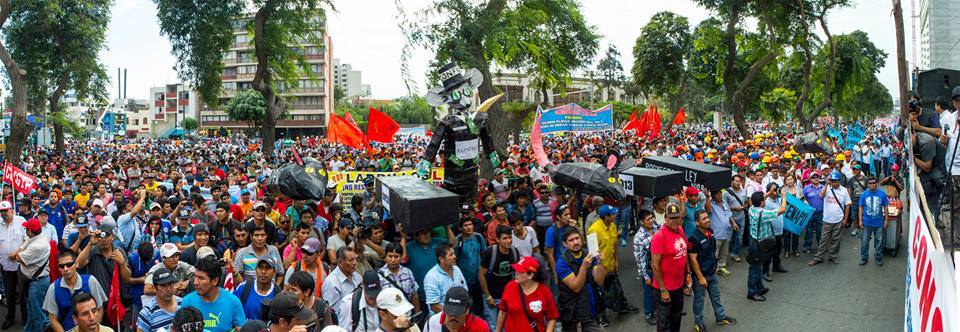After thousands of Peruvian workers took to the streets on Thursday, the Peruvian government backed off a proposal (Supreme Decree 4008) that would have made it easier for employers to conduct mass layoffs. The proposed legislation also would have allowed employers to provide wage increases, up to 20 percent, in the form of bonuses which are not included in calculating benefits, and it would have limited the Labor Ministry’s oversight.
Spearheaded by the General Confederation of Workers of Peru (CGTP), the action led to workers’ second big victory this year. In December, young workers mobilized up to 30,000 workers and their allies in a series of marches protesting a new law that reduced salaries and benefits for workers under age 25. Lawmakers repealed the law in January.
Still on the books is a law passed in December that makes it easier for companies to conduct mass layoffs if they show two consecutive months of financial losses. This legislation, Supreme Decree 013, allows employers to eliminate 10 percent of their workforce if they can meet stipulated criteria—a loophole that empowers employers to target trade unionists, pregnant women, workers suffering from occupational safety and health illnesses and older workers. CGTP leaders, who met last week with the National Labor Council, say they are making progress in discussions to amend the law, and are meeting with the Prime Minister today.
Union leaders say worker awareness, mobilization and union-driven proposals for labor law reform are key to passing measures to improve workers’ standard of living, beat back regressive labor reforms and create the conditions for regaining union density and decent work in Peru.
The union movement plans further rallies and strikes in coming months, with public-sector workers set to mobilize for their rights on Wednesday.
In July 2013, the government passed a new civil service law that eliminated the right of more than 500,000 public administration workers to collectively negotiate salaries, narrows the definition of the type of unions they could establish and prevents “essential service” unions from striking (without defining essential services).
Public employees say the law violates International Labor Organization (ILO) Convention 151 that protects the right of public-sector workers to form unions. They are seeking to raise their case at Committee on Application of Norms in the annual ILO conference in June 2014. All four confederations are formally coordinating to take the issue to the meeting, and together with the global union Public Services International, the Solidarity Center is working to prepare the labor delegates for a united front to advocate on this key Peruvian labor issue at the ILO.

